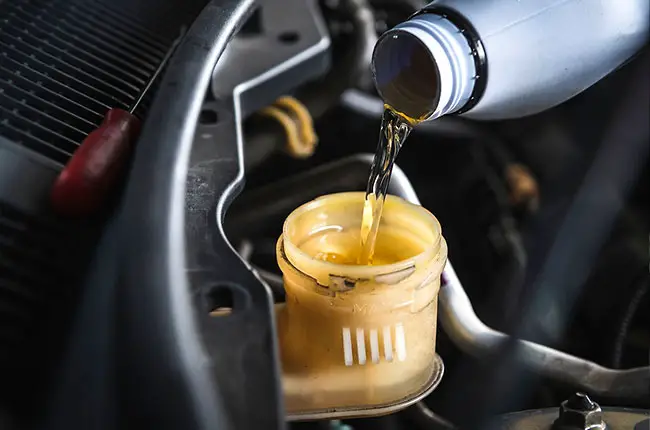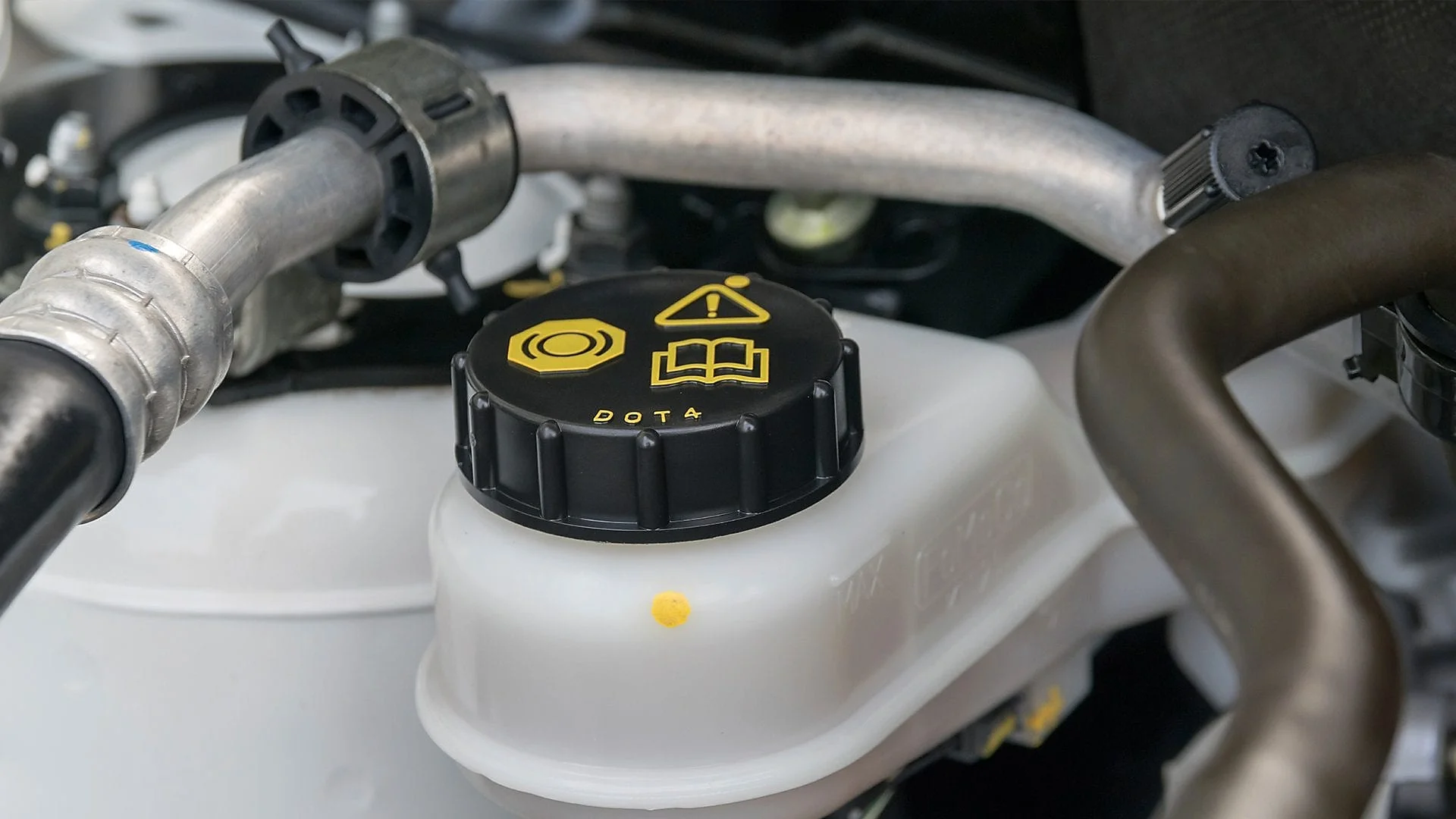So you’re asking yourself what type of fluid do I put in my car and how much is break fluid? Well we will answer this question thoroughly so you can understand what you are looking for when you go to buy it.
What Is Break Fluid
In the automotive world, break fluid is what helps your vehicle stop when you hit the brakes. The fluid helps to cool and lubricate the system. There are several different types of fluids that can be used in cars, depending on the make and model, but most vehicles use a glycol-based product because it provides the best performance.

Break fluid is the oil used in your car’s hydraulic system. This system includes the power steering and braking systems.
The purpose of break fluid is to reduce the mechanical friction between moving parts in the brake system, allowing you to stop your car easily.
The amount of break fluid in your car should be checked every time you check your oil level. If there isn’t enough break fluid, your brakes will be less effective and could lead to an accident.
Break fluid is an essential component of your vehicle’s braking system. It helps to keep all parts of the system working smoothly, preventing damage to the parts and extending their usable life. The most common type of brake fluid is DOT 3, which is compatible with most modern cars and light trucks. However, some vehicles may require DOT 4 or DOT 5.1 fluids, so be sure to check your owner’s manual before purchasing any brake fluid.
Why Do I Need It?
Brake fluid lubricates the pistons in the calipers that push against the rotor when you apply pressure on the brake pedal. This pressure causes friction on both sides of the rotor one side where it meets the pads, and one side where it meets the hub — creating heat and slowing down any spinning motion.
Brake fluid also reduces your stopping distance by increasing responsiveness between when you step on your brakes and when your car actually starts slowing down.
Without it, you’d have to press harder on the pedal for longer periods of time before getting any results from braking — which means increased wear on various parts of the system like calipers and rotors over time.
Benefits Of Break Fluid
- It is less expensive than replacing the entire brake system.
- It is easy to install and very convenient. You can do it yourself or have a professional do it for you.
- It will not void your warranty if installed by the manufacturer of your vehicle. Most manufacturers allow the use of aftermarket products as long as they do not void the warranty on their vehicle or cause damage to it.
- Some break fluids are designed with special additives that help to reduce noise, vibration, and harshness (NVH). This makes driving more comfortable and reduces fatigue while driving long distances over bumpy roads or in city traffic with lots of stop-and-go driving conditions.”
- It’s an important part of the hydraulic system in your car or truck. It helps maintain the proper hydraulic pressure and temperature inside the brake system.
- When you step on the brake pedal, fluid pumps through your vehicle’s master cylinder into each wheel cylinder. The fluid then pushes against pistons in each wheel cylinder that apply pressure to a brake pad, slowing down your vehicle.
- Brake fluid must be replaced periodically because it absorbs moisture from the air. This can cause corrosion inside your brake system.
- If you don’t replace the old fluid with fresh fluid, it could lead to a complete failure of your brakes — leading to an accident or other dangerous situation.
RELATED:
How Much Does It Cost To Change Brake Fluid?
The expense of replenishing the brake fluid will primarily be labor-related. Most automobiles will use DOT 4 brake fluid; however, some may use DOT 3. The manufacturer will typically state which brake fluid is ideal for your model so that you may use it safely.

Fortunately, brake fluid is reasonably priced. For 32 oz. of brake fluid, you should budget roughly $5.
It is preferable to let a qualified mechanic do the brake fluid replacement. Depending on the state, labor costs can range from $80 to $130.
Low brake Fluid Warning Signs & Symptoms
The best technique to determine when to change the brake fluid is to simply examine it, as was discussed in the previous section. However, you might also see unusual braking behavior that indicates the brake fluid needs to be replaced.
It’s possible that a leak has developed, with observable side effects, despite the fact that routine maintenance ought to prevent this from happening.
The following are signs of faulty braking fluid:
- ABS light turns on
- The brake pedal behaves differently
- Loss of stopping power
- Bad smell
Any symptom or indication that interferes with your braking should be treated right away. If you detect any of these symptoms, you need to stop your car as quickly as you can.
- ABS Light Turns On
Since the system cannot function correctly in the presence of insufficient brake fluid, your ABS light is likely to come on when the brake fluid is low.
Although this is not specifically related to low brake fluid, it is something to consider if your ABS light illuminates.
- Brake Pedal Behaves Differently
When applying pressure to the brake pedal, if anything seems off, it may be a sign of low or tainted brake fluid.
Numerous symptoms, such as a spongy, bouncy, or loose feeling when pressing the pedal, can indicate this issue.
- Loss Of Stopping Power
The real reduction of stopping force is the most detrimental effect of poor brake fluid. The brake fluid may be the source of a problem if your automobile does not slow down properly when you brake.
- Bad Smell
Even while a terrible scent may appear to be a fairly vague symptom, it might actually be a very dangerous sign. Your brake fluid is just one of the numerous potential sources of the odour.
Because contaminated brake fluid has a lower boiling point, it can begin to boil after several stops. This frequently results in a burning odor or a powerful chemical odor.
Conclusion
No matter what type of vehicle you drive, be sure to check the brake fluid regularly. If it’s low and you continue driving, your brake pads need to work harder than normal to compensate for lost fluid; too little fluid will cause the pad’s material to become worn down faster, which means you’ll have to replace it sooner and spend more money.
While you’re changing your brake fluid, inspect your pads for wear as well—you may need new ones in the next few months if they’re already showing signs of wear. If any other components seem worn or are damaged, consider finding an opportunity to replace them then as well. Changing the brake fluid is a quick operation that will give you peace of mind and save you money down the road.
Depending on the circumstances of your particular case, you might want to consider having a shop do the work. Fortunately, though, changing brake fluid isn’t particularly expensive. And once you’re done with the job, you’ll know that you’ve given your car a service that will pay off in the long run!
